ACC3005 Accounting Research Project: Contemporary Accounting Issues
VerifiedAdded on 2022/10/19
|9
|2480
|336
Project
AI Summary
This accounting research project delves into contemporary accounting issues, particularly within Australian organizations, with a focus on sustainability and corporate social responsibility. The research explores various methodologies, including qualitative data collection through interviews, to analyze how contemporary factors impact accounting practices. The project investigates regulatory, ethical, and sustainability issues, identifying stakeholder engagement as a key theory. The research questions address the influence of contemporary issues, organizational sustainability, and the relationship between corporate social responsibility and company performance. The project includes a literature review, critical analysis, and discussion of ethical and regulatory challenges. The project also assesses how stakeholder theory is applicable to sustainability management. The conclusion emphasizes the importance of considering contemporary factors in financial statement preparation and highlights the significance of corporate social responsibility.
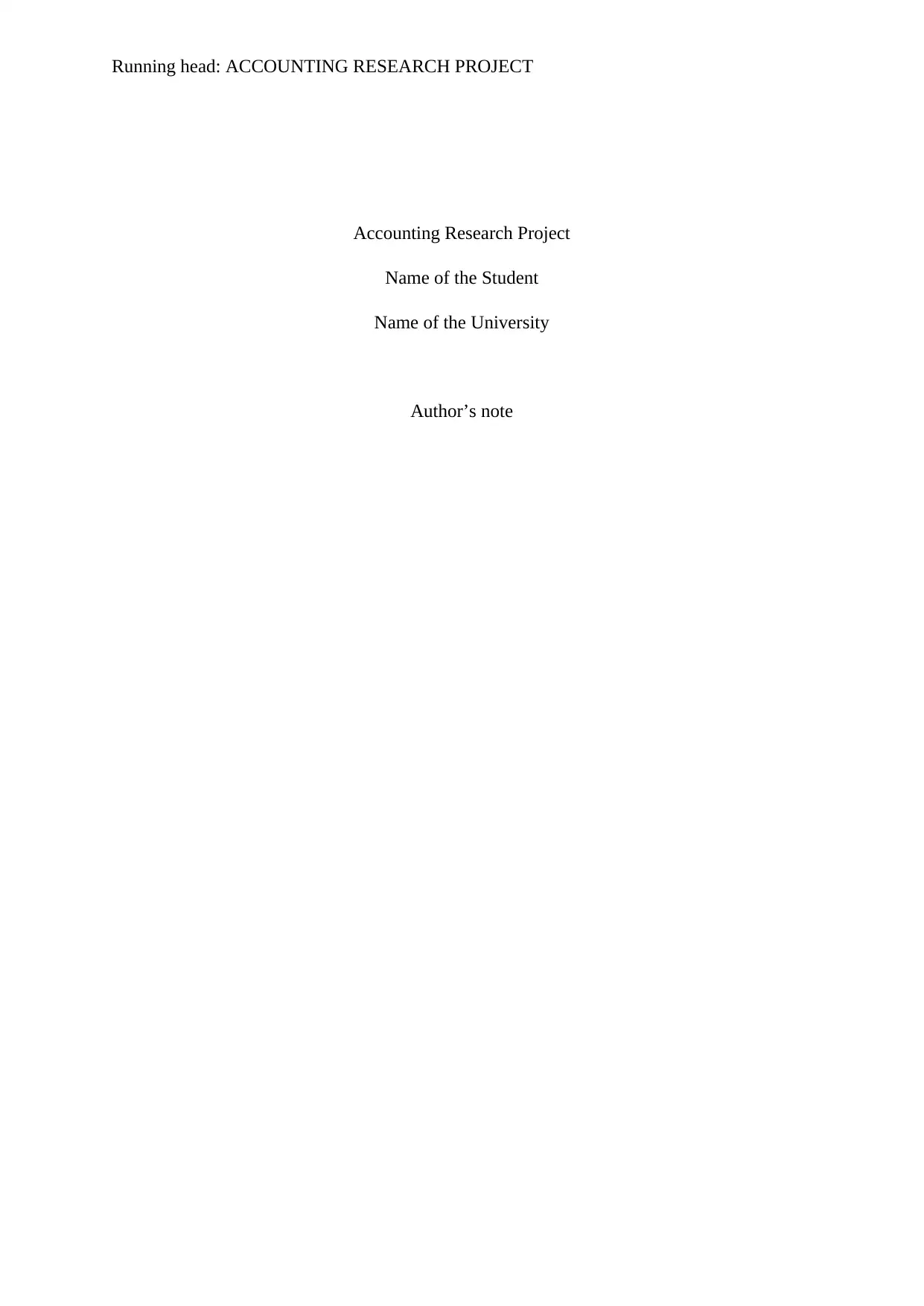
Running head: ACCOUNTING RESEARCH PROJECT
Accounting Research Project
Name of the Student
Name of the University
Author’s note
Accounting Research Project
Name of the Student
Name of the University
Author’s note
Paraphrase This Document
Need a fresh take? Get an instant paraphrase of this document with our AI Paraphraser
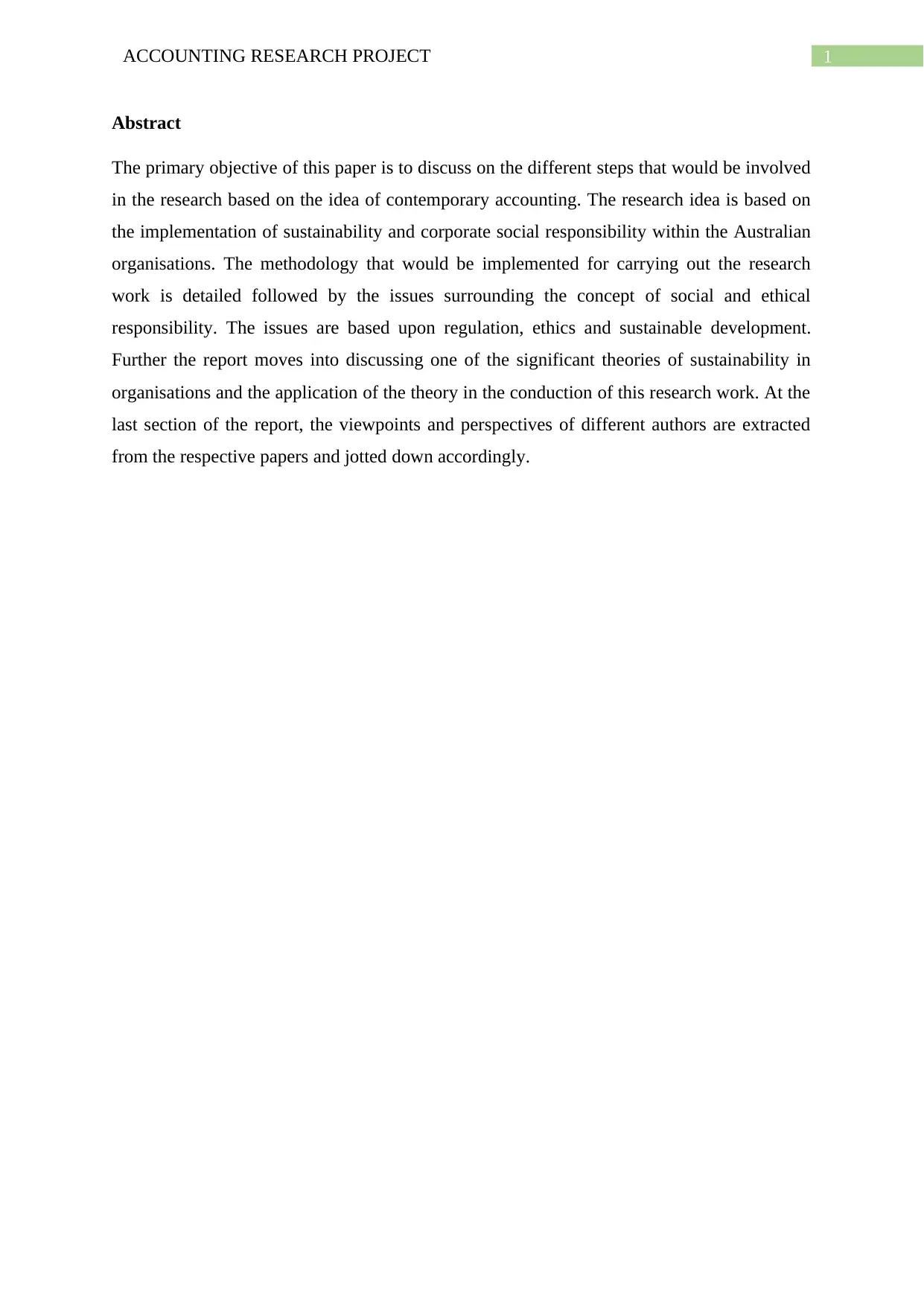
1ACCOUNTING RESEARCH PROJECT
Abstract
The primary objective of this paper is to discuss on the different steps that would be involved
in the research based on the idea of contemporary accounting. The research idea is based on
the implementation of sustainability and corporate social responsibility within the Australian
organisations. The methodology that would be implemented for carrying out the research
work is detailed followed by the issues surrounding the concept of social and ethical
responsibility. The issues are based upon regulation, ethics and sustainable development.
Further the report moves into discussing one of the significant theories of sustainability in
organisations and the application of the theory in the conduction of this research work. At the
last section of the report, the viewpoints and perspectives of different authors are extracted
from the respective papers and jotted down accordingly.
Abstract
The primary objective of this paper is to discuss on the different steps that would be involved
in the research based on the idea of contemporary accounting. The research idea is based on
the implementation of sustainability and corporate social responsibility within the Australian
organisations. The methodology that would be implemented for carrying out the research
work is detailed followed by the issues surrounding the concept of social and ethical
responsibility. The issues are based upon regulation, ethics and sustainable development.
Further the report moves into discussing one of the significant theories of sustainability in
organisations and the application of the theory in the conduction of this research work. At the
last section of the report, the viewpoints and perspectives of different authors are extracted
from the respective papers and jotted down accordingly.
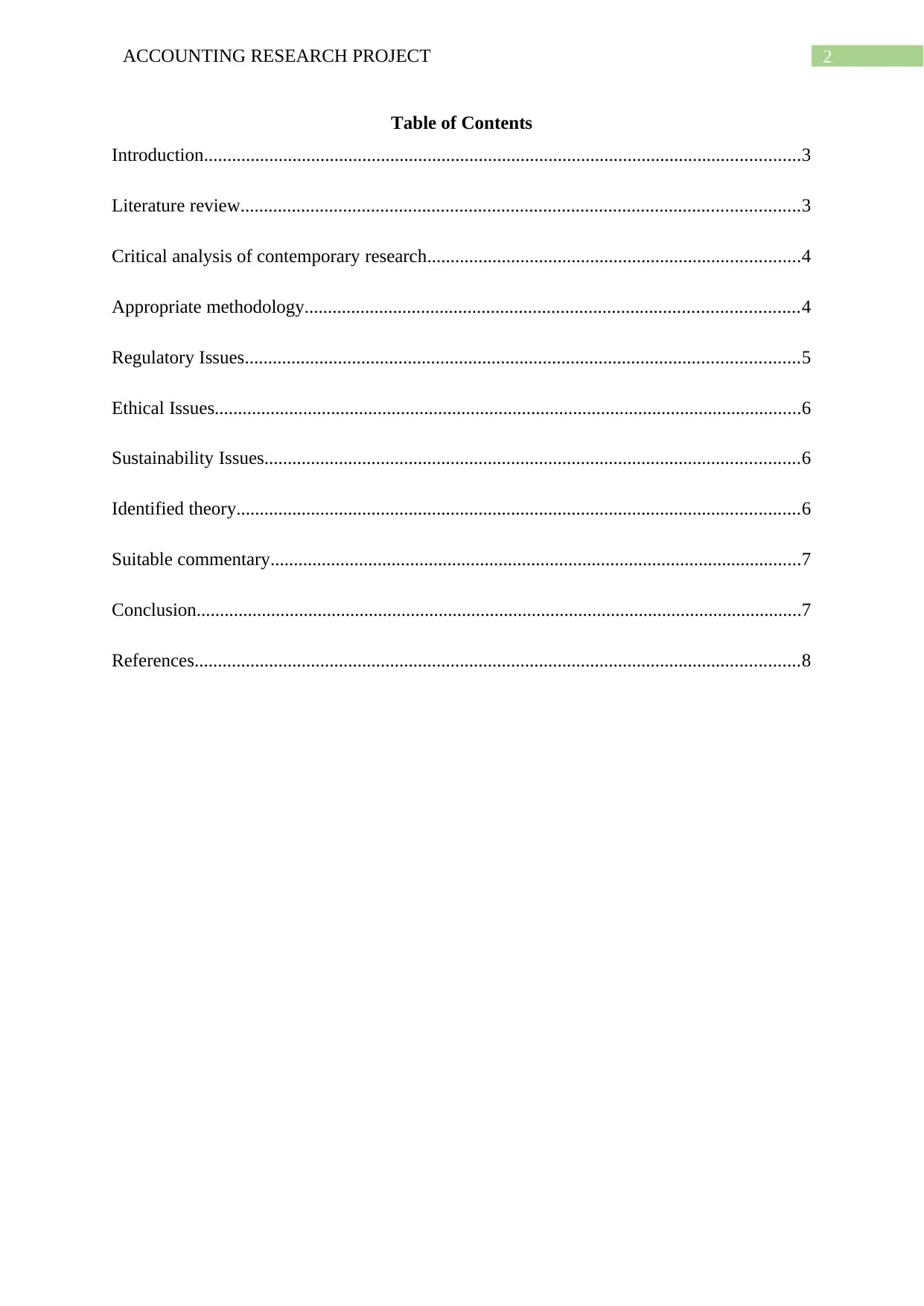
2ACCOUNTING RESEARCH PROJECT
Table of Contents
Introduction................................................................................................................................3
Literature review........................................................................................................................3
Critical analysis of contemporary research................................................................................4
Appropriate methodology..........................................................................................................4
Regulatory Issues.......................................................................................................................5
Ethical Issues..............................................................................................................................6
Sustainability Issues...................................................................................................................6
Identified theory.........................................................................................................................6
Suitable commentary..................................................................................................................7
Conclusion..................................................................................................................................7
References..................................................................................................................................8
Table of Contents
Introduction................................................................................................................................3
Literature review........................................................................................................................3
Critical analysis of contemporary research................................................................................4
Appropriate methodology..........................................................................................................4
Regulatory Issues.......................................................................................................................5
Ethical Issues..............................................................................................................................6
Sustainability Issues...................................................................................................................6
Identified theory.........................................................................................................................6
Suitable commentary..................................................................................................................7
Conclusion..................................................................................................................................7
References..................................................................................................................................8
⊘ This is a preview!⊘
Do you want full access?
Subscribe today to unlock all pages.

Trusted by 1+ million students worldwide
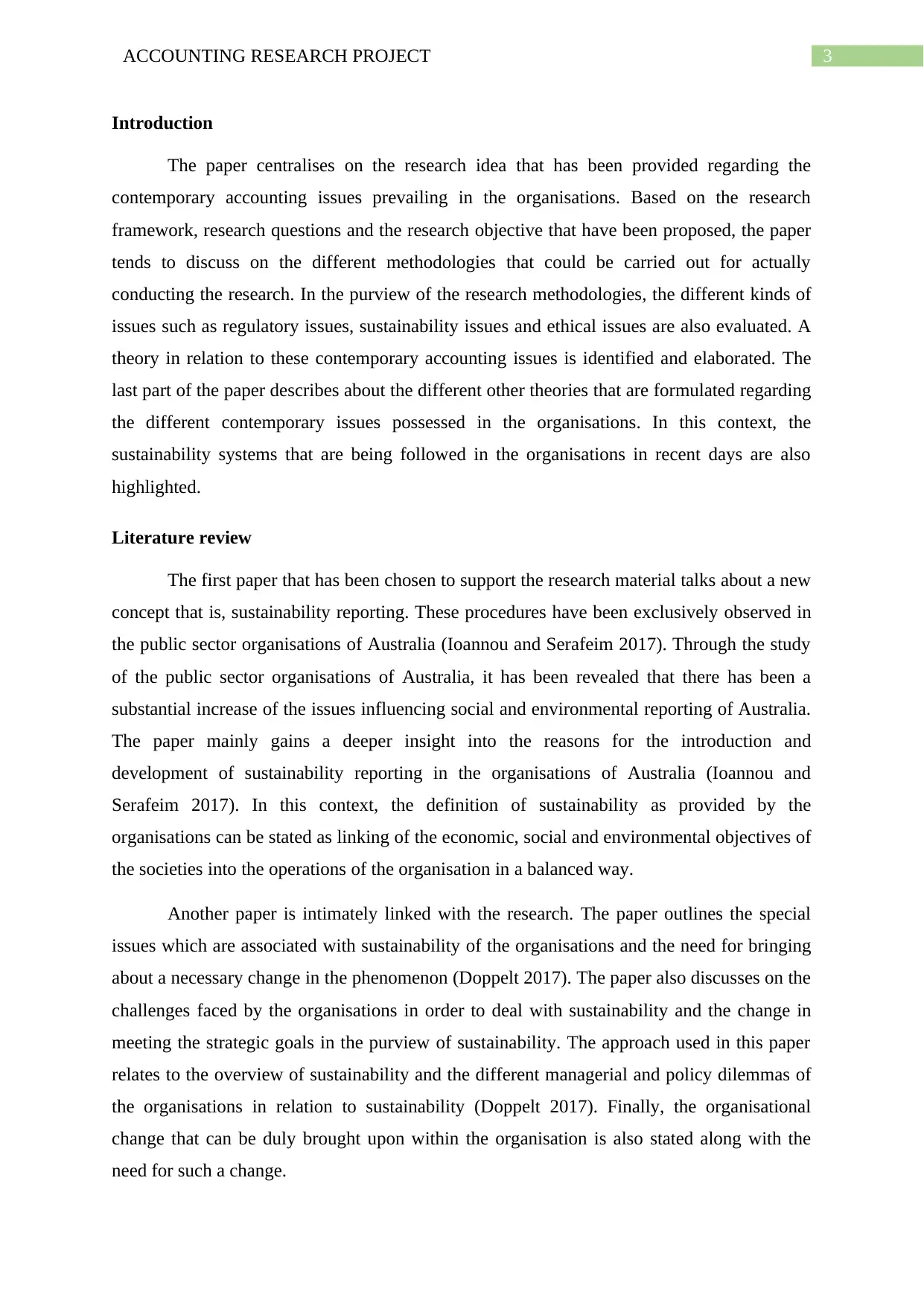
3ACCOUNTING RESEARCH PROJECT
Introduction
The paper centralises on the research idea that has been provided regarding the
contemporary accounting issues prevailing in the organisations. Based on the research
framework, research questions and the research objective that have been proposed, the paper
tends to discuss on the different methodologies that could be carried out for actually
conducting the research. In the purview of the research methodologies, the different kinds of
issues such as regulatory issues, sustainability issues and ethical issues are also evaluated. A
theory in relation to these contemporary accounting issues is identified and elaborated. The
last part of the paper describes about the different other theories that are formulated regarding
the different contemporary issues possessed in the organisations. In this context, the
sustainability systems that are being followed in the organisations in recent days are also
highlighted.
Literature review
The first paper that has been chosen to support the research material talks about a new
concept that is, sustainability reporting. These procedures have been exclusively observed in
the public sector organisations of Australia (Ioannou and Serafeim 2017). Through the study
of the public sector organisations of Australia, it has been revealed that there has been a
substantial increase of the issues influencing social and environmental reporting of Australia.
The paper mainly gains a deeper insight into the reasons for the introduction and
development of sustainability reporting in the organisations of Australia (Ioannou and
Serafeim 2017). In this context, the definition of sustainability as provided by the
organisations can be stated as linking of the economic, social and environmental objectives of
the societies into the operations of the organisation in a balanced way.
Another paper is intimately linked with the research. The paper outlines the special
issues which are associated with sustainability of the organisations and the need for bringing
about a necessary change in the phenomenon (Doppelt 2017). The paper also discusses on the
challenges faced by the organisations in order to deal with sustainability and the change in
meeting the strategic goals in the purview of sustainability. The approach used in this paper
relates to the overview of sustainability and the different managerial and policy dilemmas of
the organisations in relation to sustainability (Doppelt 2017). Finally, the organisational
change that can be duly brought upon within the organisation is also stated along with the
need for such a change.
Introduction
The paper centralises on the research idea that has been provided regarding the
contemporary accounting issues prevailing in the organisations. Based on the research
framework, research questions and the research objective that have been proposed, the paper
tends to discuss on the different methodologies that could be carried out for actually
conducting the research. In the purview of the research methodologies, the different kinds of
issues such as regulatory issues, sustainability issues and ethical issues are also evaluated. A
theory in relation to these contemporary accounting issues is identified and elaborated. The
last part of the paper describes about the different other theories that are formulated regarding
the different contemporary issues possessed in the organisations. In this context, the
sustainability systems that are being followed in the organisations in recent days are also
highlighted.
Literature review
The first paper that has been chosen to support the research material talks about a new
concept that is, sustainability reporting. These procedures have been exclusively observed in
the public sector organisations of Australia (Ioannou and Serafeim 2017). Through the study
of the public sector organisations of Australia, it has been revealed that there has been a
substantial increase of the issues influencing social and environmental reporting of Australia.
The paper mainly gains a deeper insight into the reasons for the introduction and
development of sustainability reporting in the organisations of Australia (Ioannou and
Serafeim 2017). In this context, the definition of sustainability as provided by the
organisations can be stated as linking of the economic, social and environmental objectives of
the societies into the operations of the organisation in a balanced way.
Another paper is intimately linked with the research. The paper outlines the special
issues which are associated with sustainability of the organisations and the need for bringing
about a necessary change in the phenomenon (Doppelt 2017). The paper also discusses on the
challenges faced by the organisations in order to deal with sustainability and the change in
meeting the strategic goals in the purview of sustainability. The approach used in this paper
relates to the overview of sustainability and the different managerial and policy dilemmas of
the organisations in relation to sustainability (Doppelt 2017). Finally, the organisational
change that can be duly brought upon within the organisation is also stated along with the
need for such a change.
Paraphrase This Document
Need a fresh take? Get an instant paraphrase of this document with our AI Paraphraser
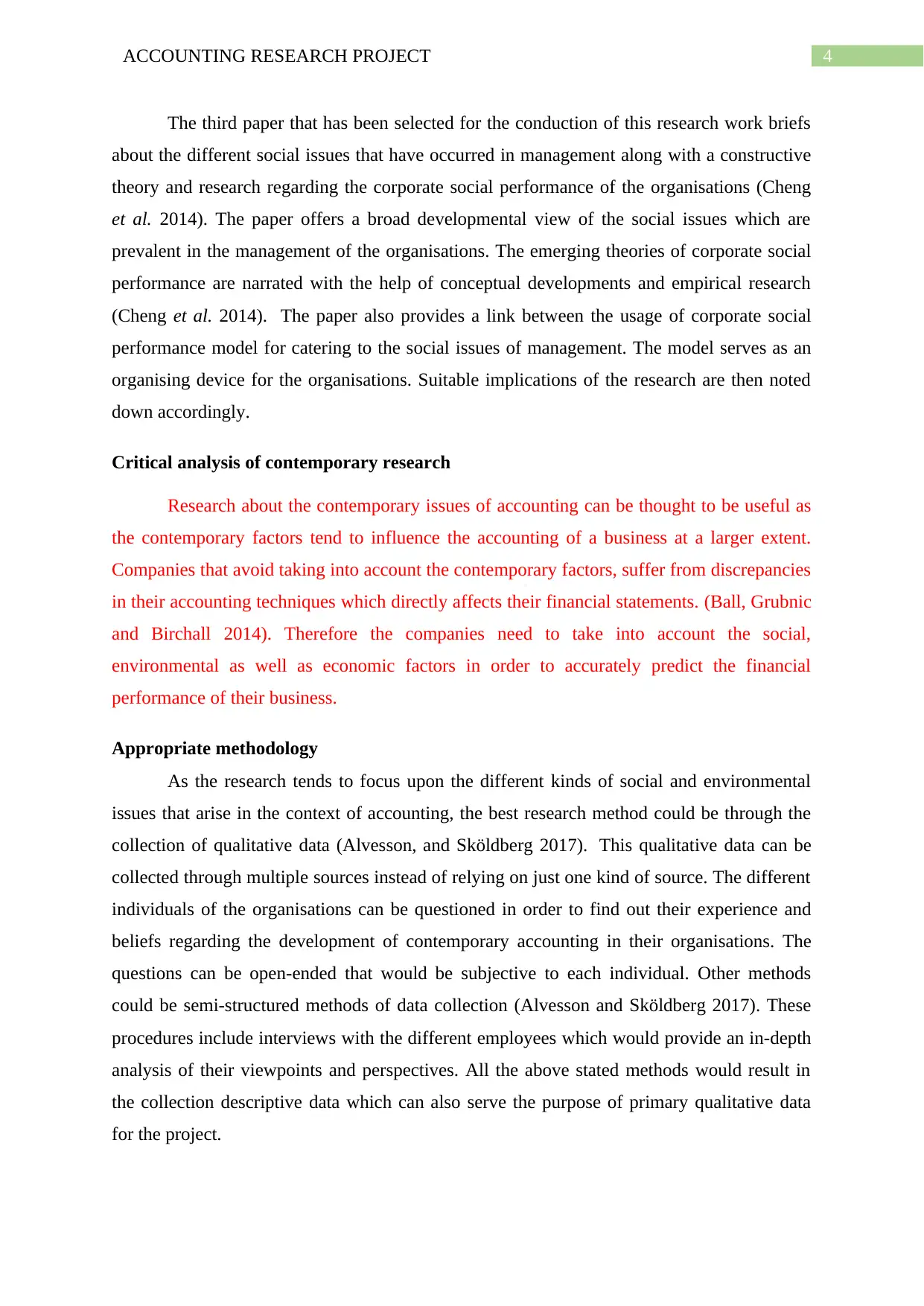
4ACCOUNTING RESEARCH PROJECT
The third paper that has been selected for the conduction of this research work briefs
about the different social issues that have occurred in management along with a constructive
theory and research regarding the corporate social performance of the organisations (Cheng
et al. 2014). The paper offers a broad developmental view of the social issues which are
prevalent in the management of the organisations. The emerging theories of corporate social
performance are narrated with the help of conceptual developments and empirical research
(Cheng et al. 2014). The paper also provides a link between the usage of corporate social
performance model for catering to the social issues of management. The model serves as an
organising device for the organisations. Suitable implications of the research are then noted
down accordingly.
Critical analysis of contemporary research
Research about the contemporary issues of accounting can be thought to be useful as
the contemporary factors tend to influence the accounting of a business at a larger extent.
Companies that avoid taking into account the contemporary factors, suffer from discrepancies
in their accounting techniques which directly affects their financial statements. (Ball, Grubnic
and Birchall 2014). Therefore the companies need to take into account the social,
environmental as well as economic factors in order to accurately predict the financial
performance of their business.
Appropriate methodology
As the research tends to focus upon the different kinds of social and environmental
issues that arise in the context of accounting, the best research method could be through the
collection of qualitative data (Alvesson, and Sköldberg 2017). This qualitative data can be
collected through multiple sources instead of relying on just one kind of source. The different
individuals of the organisations can be questioned in order to find out their experience and
beliefs regarding the development of contemporary accounting in their organisations. The
questions can be open-ended that would be subjective to each individual. Other methods
could be semi-structured methods of data collection (Alvesson and Sköldberg 2017). These
procedures include interviews with the different employees which would provide an in-depth
analysis of their viewpoints and perspectives. All the above stated methods would result in
the collection descriptive data which can also serve the purpose of primary qualitative data
for the project.
The third paper that has been selected for the conduction of this research work briefs
about the different social issues that have occurred in management along with a constructive
theory and research regarding the corporate social performance of the organisations (Cheng
et al. 2014). The paper offers a broad developmental view of the social issues which are
prevalent in the management of the organisations. The emerging theories of corporate social
performance are narrated with the help of conceptual developments and empirical research
(Cheng et al. 2014). The paper also provides a link between the usage of corporate social
performance model for catering to the social issues of management. The model serves as an
organising device for the organisations. Suitable implications of the research are then noted
down accordingly.
Critical analysis of contemporary research
Research about the contemporary issues of accounting can be thought to be useful as
the contemporary factors tend to influence the accounting of a business at a larger extent.
Companies that avoid taking into account the contemporary factors, suffer from discrepancies
in their accounting techniques which directly affects their financial statements. (Ball, Grubnic
and Birchall 2014). Therefore the companies need to take into account the social,
environmental as well as economic factors in order to accurately predict the financial
performance of their business.
Appropriate methodology
As the research tends to focus upon the different kinds of social and environmental
issues that arise in the context of accounting, the best research method could be through the
collection of qualitative data (Alvesson, and Sköldberg 2017). This qualitative data can be
collected through multiple sources instead of relying on just one kind of source. The different
individuals of the organisations can be questioned in order to find out their experience and
beliefs regarding the development of contemporary accounting in their organisations. The
questions can be open-ended that would be subjective to each individual. Other methods
could be semi-structured methods of data collection (Alvesson and Sköldberg 2017). These
procedures include interviews with the different employees which would provide an in-depth
analysis of their viewpoints and perspectives. All the above stated methods would result in
the collection descriptive data which can also serve the purpose of primary qualitative data
for the project.
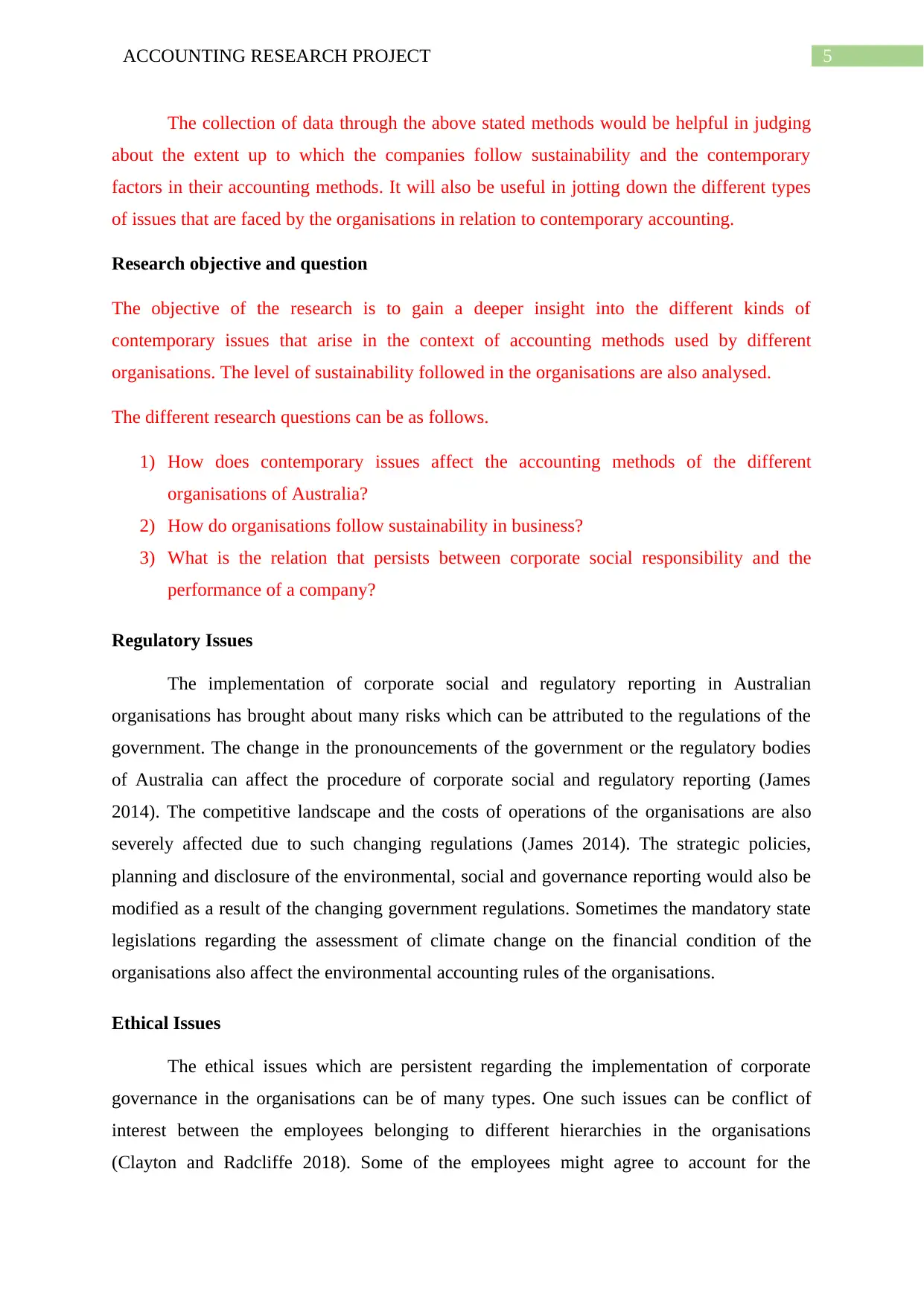
5ACCOUNTING RESEARCH PROJECT
The collection of data through the above stated methods would be helpful in judging
about the extent up to which the companies follow sustainability and the contemporary
factors in their accounting methods. It will also be useful in jotting down the different types
of issues that are faced by the organisations in relation to contemporary accounting.
Research objective and question
The objective of the research is to gain a deeper insight into the different kinds of
contemporary issues that arise in the context of accounting methods used by different
organisations. The level of sustainability followed in the organisations are also analysed.
The different research questions can be as follows.
1) How does contemporary issues affect the accounting methods of the different
organisations of Australia?
2) How do organisations follow sustainability in business?
3) What is the relation that persists between corporate social responsibility and the
performance of a company?
Regulatory Issues
The implementation of corporate social and regulatory reporting in Australian
organisations has brought about many risks which can be attributed to the regulations of the
government. The change in the pronouncements of the government or the regulatory bodies
of Australia can affect the procedure of corporate social and regulatory reporting (James
2014). The competitive landscape and the costs of operations of the organisations are also
severely affected due to such changing regulations (James 2014). The strategic policies,
planning and disclosure of the environmental, social and governance reporting would also be
modified as a result of the changing government regulations. Sometimes the mandatory state
legislations regarding the assessment of climate change on the financial condition of the
organisations also affect the environmental accounting rules of the organisations.
Ethical Issues
The ethical issues which are persistent regarding the implementation of corporate
governance in the organisations can be of many types. One such issues can be conflict of
interest between the employees belonging to different hierarchies in the organisations
(Clayton and Radcliffe 2018). Some of the employees might agree to account for the
The collection of data through the above stated methods would be helpful in judging
about the extent up to which the companies follow sustainability and the contemporary
factors in their accounting methods. It will also be useful in jotting down the different types
of issues that are faced by the organisations in relation to contemporary accounting.
Research objective and question
The objective of the research is to gain a deeper insight into the different kinds of
contemporary issues that arise in the context of accounting methods used by different
organisations. The level of sustainability followed in the organisations are also analysed.
The different research questions can be as follows.
1) How does contemporary issues affect the accounting methods of the different
organisations of Australia?
2) How do organisations follow sustainability in business?
3) What is the relation that persists between corporate social responsibility and the
performance of a company?
Regulatory Issues
The implementation of corporate social and regulatory reporting in Australian
organisations has brought about many risks which can be attributed to the regulations of the
government. The change in the pronouncements of the government or the regulatory bodies
of Australia can affect the procedure of corporate social and regulatory reporting (James
2014). The competitive landscape and the costs of operations of the organisations are also
severely affected due to such changing regulations (James 2014). The strategic policies,
planning and disclosure of the environmental, social and governance reporting would also be
modified as a result of the changing government regulations. Sometimes the mandatory state
legislations regarding the assessment of climate change on the financial condition of the
organisations also affect the environmental accounting rules of the organisations.
Ethical Issues
The ethical issues which are persistent regarding the implementation of corporate
governance in the organisations can be of many types. One such issues can be conflict of
interest between the employees belonging to different hierarchies in the organisations
(Clayton and Radcliffe 2018). Some of the employees might agree to account for the
⊘ This is a preview!⊘
Do you want full access?
Subscribe today to unlock all pages.

Trusted by 1+ million students worldwide
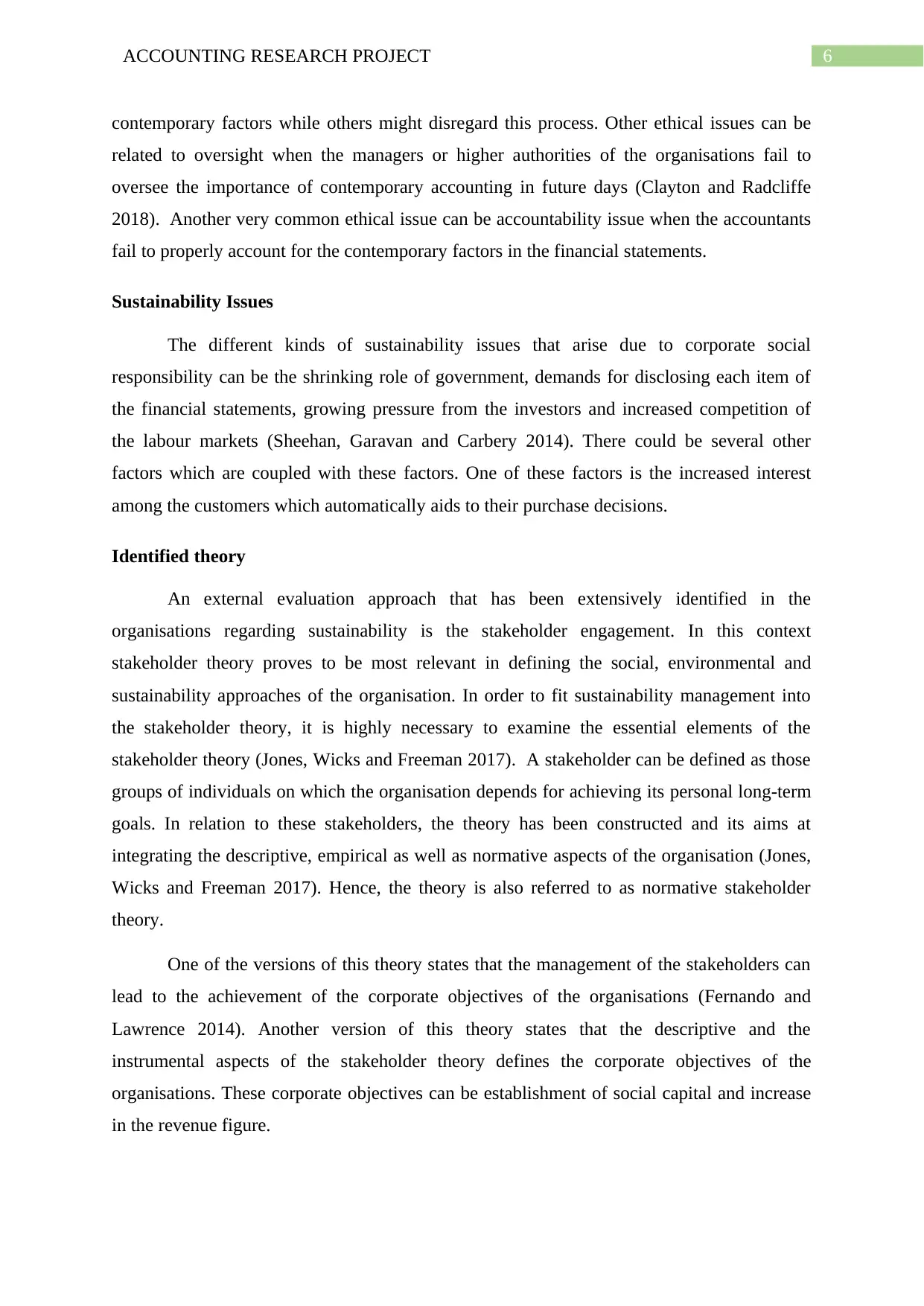
6ACCOUNTING RESEARCH PROJECT
contemporary factors while others might disregard this process. Other ethical issues can be
related to oversight when the managers or higher authorities of the organisations fail to
oversee the importance of contemporary accounting in future days (Clayton and Radcliffe
2018). Another very common ethical issue can be accountability issue when the accountants
fail to properly account for the contemporary factors in the financial statements.
Sustainability Issues
The different kinds of sustainability issues that arise due to corporate social
responsibility can be the shrinking role of government, demands for disclosing each item of
the financial statements, growing pressure from the investors and increased competition of
the labour markets (Sheehan, Garavan and Carbery 2014). There could be several other
factors which are coupled with these factors. One of these factors is the increased interest
among the customers which automatically aids to their purchase decisions.
Identified theory
An external evaluation approach that has been extensively identified in the
organisations regarding sustainability is the stakeholder engagement. In this context
stakeholder theory proves to be most relevant in defining the social, environmental and
sustainability approaches of the organisation. In order to fit sustainability management into
the stakeholder theory, it is highly necessary to examine the essential elements of the
stakeholder theory (Jones, Wicks and Freeman 2017). A stakeholder can be defined as those
groups of individuals on which the organisation depends for achieving its personal long-term
goals. In relation to these stakeholders, the theory has been constructed and its aims at
integrating the descriptive, empirical as well as normative aspects of the organisation (Jones,
Wicks and Freeman 2017). Hence, the theory is also referred to as normative stakeholder
theory.
One of the versions of this theory states that the management of the stakeholders can
lead to the achievement of the corporate objectives of the organisations (Fernando and
Lawrence 2014). Another version of this theory states that the descriptive and the
instrumental aspects of the stakeholder theory defines the corporate objectives of the
organisations. These corporate objectives can be establishment of social capital and increase
in the revenue figure.
contemporary factors while others might disregard this process. Other ethical issues can be
related to oversight when the managers or higher authorities of the organisations fail to
oversee the importance of contemporary accounting in future days (Clayton and Radcliffe
2018). Another very common ethical issue can be accountability issue when the accountants
fail to properly account for the contemporary factors in the financial statements.
Sustainability Issues
The different kinds of sustainability issues that arise due to corporate social
responsibility can be the shrinking role of government, demands for disclosing each item of
the financial statements, growing pressure from the investors and increased competition of
the labour markets (Sheehan, Garavan and Carbery 2014). There could be several other
factors which are coupled with these factors. One of these factors is the increased interest
among the customers which automatically aids to their purchase decisions.
Identified theory
An external evaluation approach that has been extensively identified in the
organisations regarding sustainability is the stakeholder engagement. In this context
stakeholder theory proves to be most relevant in defining the social, environmental and
sustainability approaches of the organisation. In order to fit sustainability management into
the stakeholder theory, it is highly necessary to examine the essential elements of the
stakeholder theory (Jones, Wicks and Freeman 2017). A stakeholder can be defined as those
groups of individuals on which the organisation depends for achieving its personal long-term
goals. In relation to these stakeholders, the theory has been constructed and its aims at
integrating the descriptive, empirical as well as normative aspects of the organisation (Jones,
Wicks and Freeman 2017). Hence, the theory is also referred to as normative stakeholder
theory.
One of the versions of this theory states that the management of the stakeholders can
lead to the achievement of the corporate objectives of the organisations (Fernando and
Lawrence 2014). Another version of this theory states that the descriptive and the
instrumental aspects of the stakeholder theory defines the corporate objectives of the
organisations. These corporate objectives can be establishment of social capital and increase
in the revenue figure.
Paraphrase This Document
Need a fresh take? Get an instant paraphrase of this document with our AI Paraphraser
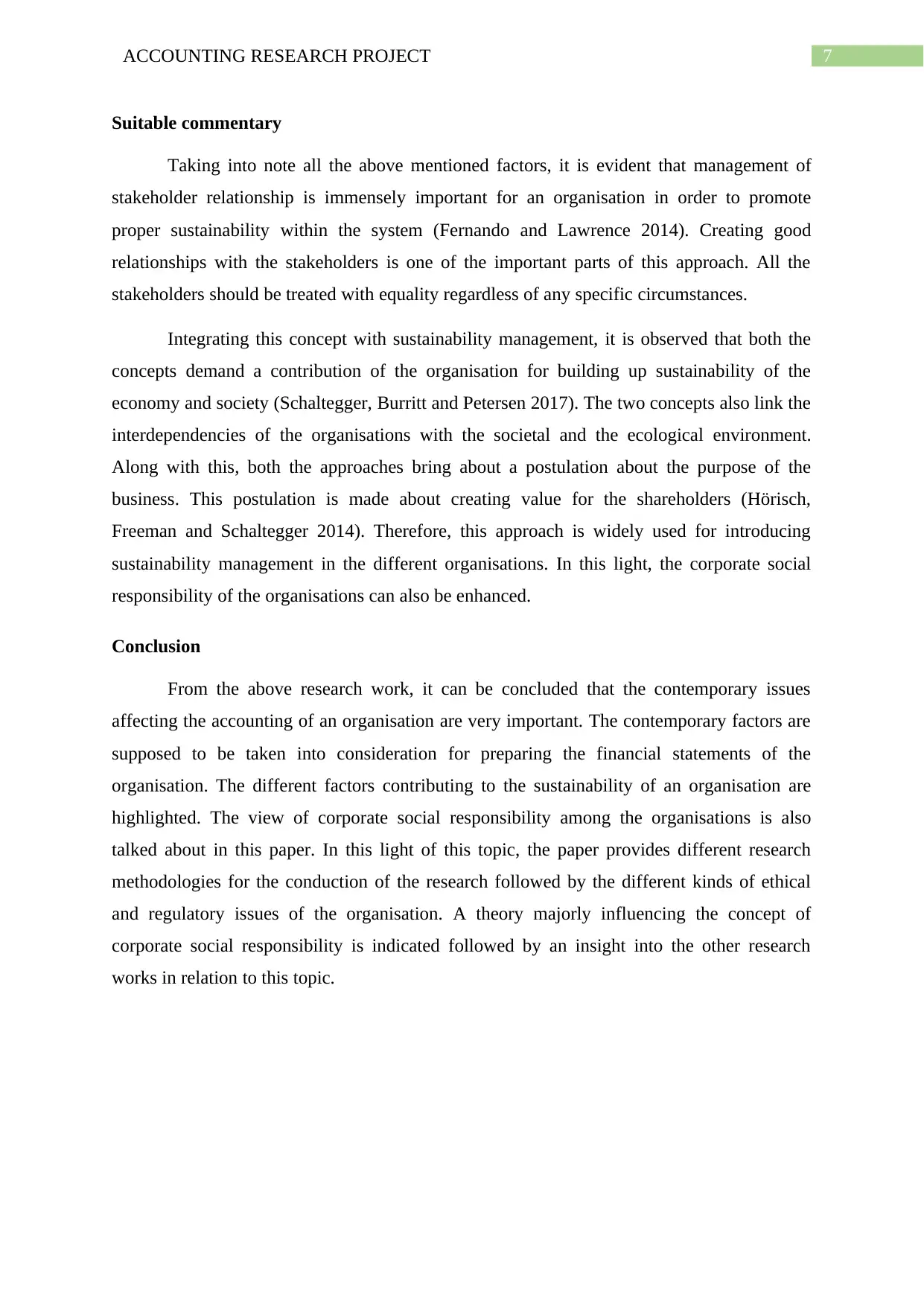
7ACCOUNTING RESEARCH PROJECT
Suitable commentary
Taking into note all the above mentioned factors, it is evident that management of
stakeholder relationship is immensely important for an organisation in order to promote
proper sustainability within the system (Fernando and Lawrence 2014). Creating good
relationships with the stakeholders is one of the important parts of this approach. All the
stakeholders should be treated with equality regardless of any specific circumstances.
Integrating this concept with sustainability management, it is observed that both the
concepts demand a contribution of the organisation for building up sustainability of the
economy and society (Schaltegger, Burritt and Petersen 2017). The two concepts also link the
interdependencies of the organisations with the societal and the ecological environment.
Along with this, both the approaches bring about a postulation about the purpose of the
business. This postulation is made about creating value for the shareholders (Hörisch,
Freeman and Schaltegger 2014). Therefore, this approach is widely used for introducing
sustainability management in the different organisations. In this light, the corporate social
responsibility of the organisations can also be enhanced.
Conclusion
From the above research work, it can be concluded that the contemporary issues
affecting the accounting of an organisation are very important. The contemporary factors are
supposed to be taken into consideration for preparing the financial statements of the
organisation. The different factors contributing to the sustainability of an organisation are
highlighted. The view of corporate social responsibility among the organisations is also
talked about in this paper. In this light of this topic, the paper provides different research
methodologies for the conduction of the research followed by the different kinds of ethical
and regulatory issues of the organisation. A theory majorly influencing the concept of
corporate social responsibility is indicated followed by an insight into the other research
works in relation to this topic.
Suitable commentary
Taking into note all the above mentioned factors, it is evident that management of
stakeholder relationship is immensely important for an organisation in order to promote
proper sustainability within the system (Fernando and Lawrence 2014). Creating good
relationships with the stakeholders is one of the important parts of this approach. All the
stakeholders should be treated with equality regardless of any specific circumstances.
Integrating this concept with sustainability management, it is observed that both the
concepts demand a contribution of the organisation for building up sustainability of the
economy and society (Schaltegger, Burritt and Petersen 2017). The two concepts also link the
interdependencies of the organisations with the societal and the ecological environment.
Along with this, both the approaches bring about a postulation about the purpose of the
business. This postulation is made about creating value for the shareholders (Hörisch,
Freeman and Schaltegger 2014). Therefore, this approach is widely used for introducing
sustainability management in the different organisations. In this light, the corporate social
responsibility of the organisations can also be enhanced.
Conclusion
From the above research work, it can be concluded that the contemporary issues
affecting the accounting of an organisation are very important. The contemporary factors are
supposed to be taken into consideration for preparing the financial statements of the
organisation. The different factors contributing to the sustainability of an organisation are
highlighted. The view of corporate social responsibility among the organisations is also
talked about in this paper. In this light of this topic, the paper provides different research
methodologies for the conduction of the research followed by the different kinds of ethical
and regulatory issues of the organisation. A theory majorly influencing the concept of
corporate social responsibility is indicated followed by an insight into the other research
works in relation to this topic.
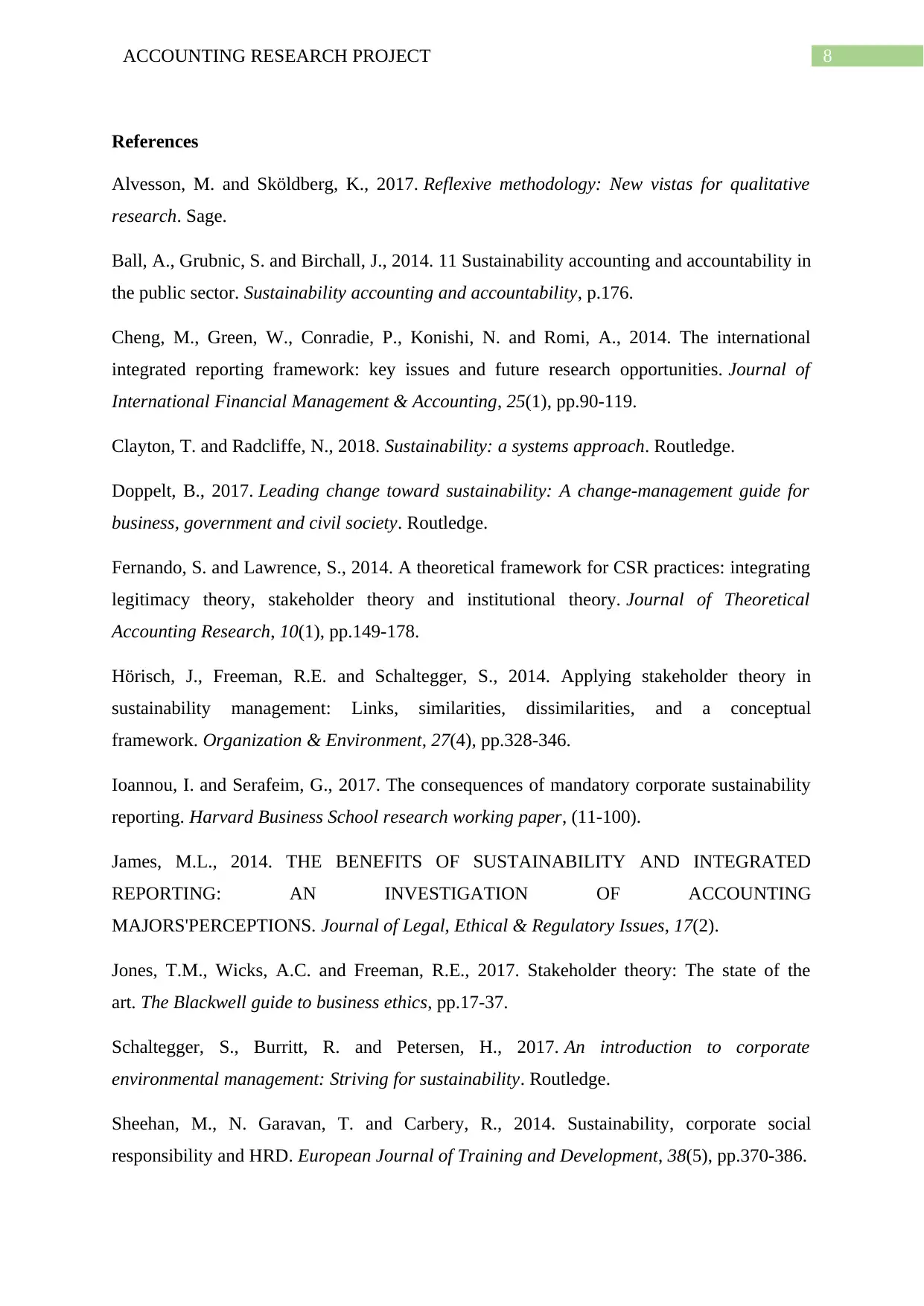
8ACCOUNTING RESEARCH PROJECT
References
Alvesson, M. and Sköldberg, K., 2017. Reflexive methodology: New vistas for qualitative
research. Sage.
Ball, A., Grubnic, S. and Birchall, J., 2014. 11 Sustainability accounting and accountability in
the public sector. Sustainability accounting and accountability, p.176.
Cheng, M., Green, W., Conradie, P., Konishi, N. and Romi, A., 2014. The international
integrated reporting framework: key issues and future research opportunities. Journal of
International Financial Management & Accounting, 25(1), pp.90-119.
Clayton, T. and Radcliffe, N., 2018. Sustainability: a systems approach. Routledge.
Doppelt, B., 2017. Leading change toward sustainability: A change-management guide for
business, government and civil society. Routledge.
Fernando, S. and Lawrence, S., 2014. A theoretical framework for CSR practices: integrating
legitimacy theory, stakeholder theory and institutional theory. Journal of Theoretical
Accounting Research, 10(1), pp.149-178.
Hörisch, J., Freeman, R.E. and Schaltegger, S., 2014. Applying stakeholder theory in
sustainability management: Links, similarities, dissimilarities, and a conceptual
framework. Organization & Environment, 27(4), pp.328-346.
Ioannou, I. and Serafeim, G., 2017. The consequences of mandatory corporate sustainability
reporting. Harvard Business School research working paper, (11-100).
James, M.L., 2014. THE BENEFITS OF SUSTAINABILITY AND INTEGRATED
REPORTING: AN INVESTIGATION OF ACCOUNTING
MAJORS'PERCEPTIONS. Journal of Legal, Ethical & Regulatory Issues, 17(2).
Jones, T.M., Wicks, A.C. and Freeman, R.E., 2017. Stakeholder theory: The state of the
art. The Blackwell guide to business ethics, pp.17-37.
Schaltegger, S., Burritt, R. and Petersen, H., 2017. An introduction to corporate
environmental management: Striving for sustainability. Routledge.
Sheehan, M., N. Garavan, T. and Carbery, R., 2014. Sustainability, corporate social
responsibility and HRD. European Journal of Training and Development, 38(5), pp.370-386.
References
Alvesson, M. and Sköldberg, K., 2017. Reflexive methodology: New vistas for qualitative
research. Sage.
Ball, A., Grubnic, S. and Birchall, J., 2014. 11 Sustainability accounting and accountability in
the public sector. Sustainability accounting and accountability, p.176.
Cheng, M., Green, W., Conradie, P., Konishi, N. and Romi, A., 2014. The international
integrated reporting framework: key issues and future research opportunities. Journal of
International Financial Management & Accounting, 25(1), pp.90-119.
Clayton, T. and Radcliffe, N., 2018. Sustainability: a systems approach. Routledge.
Doppelt, B., 2017. Leading change toward sustainability: A change-management guide for
business, government and civil society. Routledge.
Fernando, S. and Lawrence, S., 2014. A theoretical framework for CSR practices: integrating
legitimacy theory, stakeholder theory and institutional theory. Journal of Theoretical
Accounting Research, 10(1), pp.149-178.
Hörisch, J., Freeman, R.E. and Schaltegger, S., 2014. Applying stakeholder theory in
sustainability management: Links, similarities, dissimilarities, and a conceptual
framework. Organization & Environment, 27(4), pp.328-346.
Ioannou, I. and Serafeim, G., 2017. The consequences of mandatory corporate sustainability
reporting. Harvard Business School research working paper, (11-100).
James, M.L., 2014. THE BENEFITS OF SUSTAINABILITY AND INTEGRATED
REPORTING: AN INVESTIGATION OF ACCOUNTING
MAJORS'PERCEPTIONS. Journal of Legal, Ethical & Regulatory Issues, 17(2).
Jones, T.M., Wicks, A.C. and Freeman, R.E., 2017. Stakeholder theory: The state of the
art. The Blackwell guide to business ethics, pp.17-37.
Schaltegger, S., Burritt, R. and Petersen, H., 2017. An introduction to corporate
environmental management: Striving for sustainability. Routledge.
Sheehan, M., N. Garavan, T. and Carbery, R., 2014. Sustainability, corporate social
responsibility and HRD. European Journal of Training and Development, 38(5), pp.370-386.
⊘ This is a preview!⊘
Do you want full access?
Subscribe today to unlock all pages.

Trusted by 1+ million students worldwide
1 out of 9
Related Documents
Your All-in-One AI-Powered Toolkit for Academic Success.
+13062052269
info@desklib.com
Available 24*7 on WhatsApp / Email
![[object Object]](/_next/static/media/star-bottom.7253800d.svg)
Unlock your academic potential
Copyright © 2020–2026 A2Z Services. All Rights Reserved. Developed and managed by ZUCOL.





